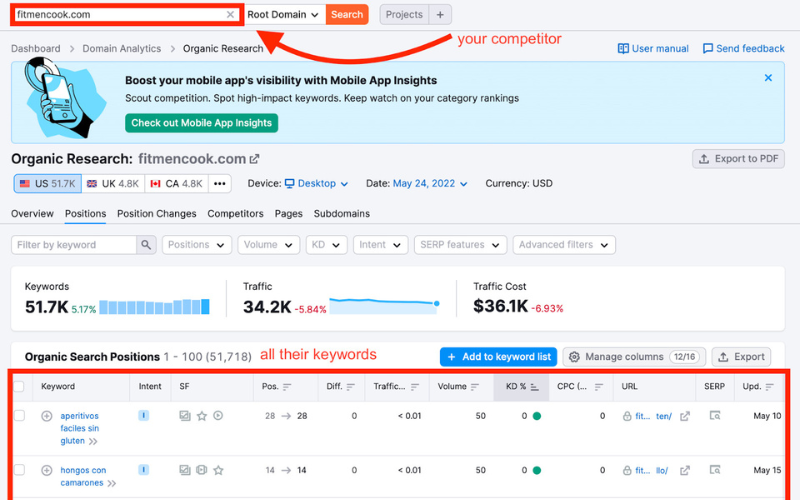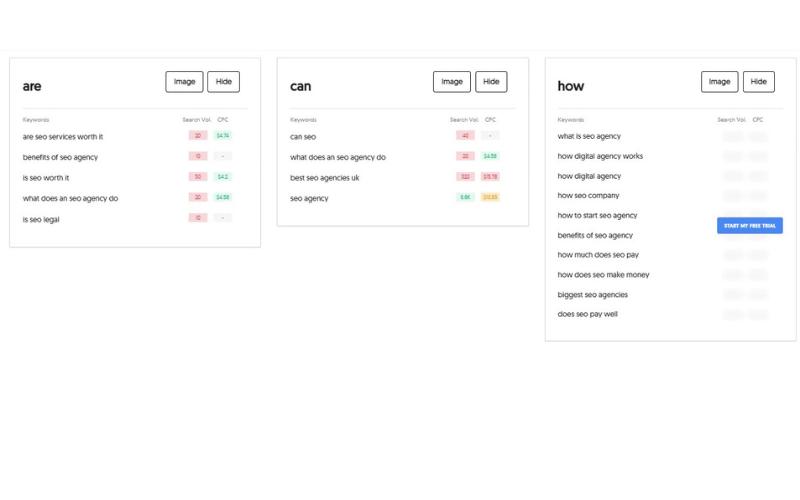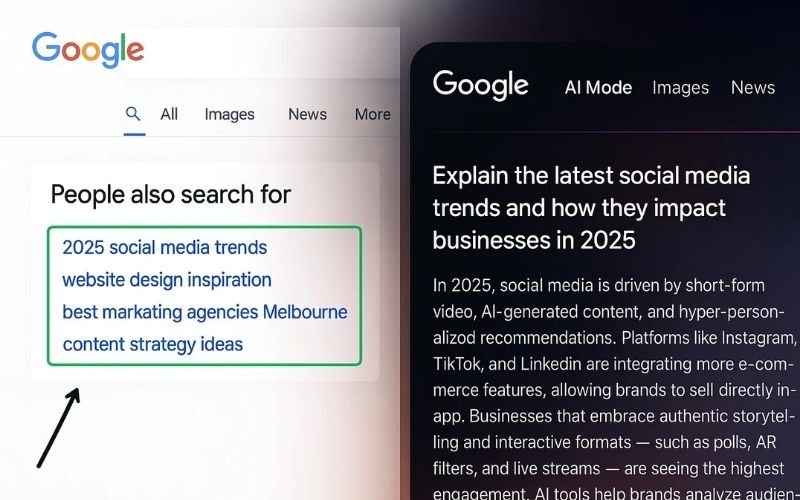
How To Find Low Competition Keywords Using Free Tools
The world of search engine optimisation (SEO) is extremely competitive. You could be banking on high converting keywords for your brand's search potential only to find out you have several competitors, some of them high profile websites, already using them. The counter punch to this is using high quality but low competition keywords.
In this blog, we will share tips and tricks for making your brand's SEO presence prominent and productive by picking these low competition keywords and integrating accordingly. The best part is that you can unlock them with all the free tools we'll share with you!
What's Inside?
1. What Are Low Competition Keywords?
2. Free Tools You Can Use to Find Low Competition Keywords
3. Let's Begin The Search for Low Competition Keywords
- Identify the topic you'd like to rank on
- Do keyword research and build your initial keyword list from there
- Identify the opportunities for the topic
- Use AI to counter-check your keyword research
4. Final Steps
What are Low Competition Keywords?
Low-competition keywords are often referred to as the low-hanging fruit in the world of SEO keywording because they are not as frequently used by rival brands and big companies yet they provide you with just as much opportunity.
Starting your SEO strategy with these low-competition keywords positions your brand to achieve organic reach without pouring too much effort and money into your social media promotions.
How to Find Low Competition Keywords by Using Free Tools?
To get started, you’ll need these free tools offering the best keyword research experience for your SEO strategy and it also helps to learn how to find low-competition keywords with high traffic.
These include Google Search Console, Keyword Planner, and direct SERP analysis. They reveal which keywords are the most industry-relevant, setting you up for a larger chance at success.
You may also use ChatGPT, Semrush, and ScreamingFrog to further strengthen your strategy. Your content will ultimately expose what the most probable and adequate keywords are.
Researching these will be more of a manual process but we guarantee this will allow you better insight into what fits your brand the best.
Let's Begin the Search for Low Competition Keywords.
1. Identify the Topic You'd Like to Rank On
The primary objective here is to find high search volume, low competition keywords from SERPs. Using the free tools to your advantage, here's how you can start.
You must start out with a clear idea on what topic you'd like your website to rank on. What does your brand stand for? What problems/concerns does it aim to solve? What are your goals and mission? These are some relevant points in order to determine where to start your research.
You will also need to delve deeper into your keyword strategy by looking at your competitors’ websites and their content.
Try the ScreamingFrog's free website content detection tool to walk through the website's best-performing content. Be aware of potential topics and sub-topics you haven’t considered before.
2. Do Keyword Research and Build Your Initial Keyword List From There
Analyse further and formulate a list of initial keywords stemming from your preferred topic.
Run the Semrush Organic Research tool, input your competitor's website's domain, and click Search. You'll see the list of keywords attributed to their rank, specifically those in Google's top 100 organic search results.

Use filters like “keyword difficulty” (KD) as this measures the difficulty for a keyword to outrank organically against top websites and brands on Google searches. It's a good starting point for you to see which keywords are competitive enough without worrying whether your competitors are already using them.
To guide you better, these are the keyword difficulty ratings from Semrush and what it means:
- Below 30%: Easiest to rank keywords, primarily due to low search volume and highly-specific search intent
- From 30%-49%: Keywords within this rating are best for those starting out, with medium chances of ranking in Google searches.
- From 50%-69%: Keywords within this percentage will encounter difficulty in ranking against competitors, unless engaging content and relevant backlinks are employed.
- Above 69%: These are keywords with the most difficulty in ranking. You'll need an arduous SEO and link-building strategy along with the high performing responsive website design to even crack Google's top 20 search results. Starting with these keywords isn't advisable due to competition.
3. Identify the Opportunities for the Topic.
After identifying your topic and building your keyword list, it's time to find out which of these will generate the most search queries from SERPs users. There are a couple of tools that can help.
But you will need to start by determining the audience’s common obstacles and enquiries you want to target that are correlative to the topic you've researched.
For example, your chosen topic will most likely be "digital marketing" if you're running a digital marketing agency. It's a broad one, and to make it specific, you'll need to find out what people like to know about it.
Examples include "digital marketing agency for small business" or "digital marketing strategies for my small business". These already ressemble Google search prompts, and it's a great opportunity for you to either present your brand as an industry leader or one that addresses their concerns.
Useful Tools
You can also input your topics in a free search listening tool like AnswerThePublic. Here's how it will work on strengthening your keywords.

The tool presents you with some possible Google search prompts, particularly from enquiries that start with 'are', 'can', and 'how'. People who commonly use Google and other SERPs begin their queries with these words. From there, you can generate potential competitive low-volume keywords within your topic.
Another useful tool is SearchResponses.io. After getting the keywords/search prompts from AnswerThePublic, you can run them through the platform to determine their popularity or the number of searches made for that prompt at the moment. The objective is to identify keywords with a low amount of search prompts yet competitive enough to be ranked.
4. Use AI to Counter-Check Your Keyword Research.
As AI continues to make waves in the digital space, it's more useful than ever. And in this case, you can use it to counter-check your content framework which includes your keyword research, and ensure you aren't overlooking anything.
Ever heard of ChatGPT before? We bet you already did! You’ll definitely need this to intensify your keyword research.
Start by inputting your query into AI like ChatGPT and initiate the conversation from there. See this example for reference.
We simply began by asking Chat GPT to submit a variety of subtopics relevant to a website offering SEO services. This can assist in narrowing down your initial search and generate keywords and content from.
You will need to verify these via Google search results and ensure that these subtopics and chosen keywords are already present in both your competitor’s and your website.
Pages containing that term should show up.
You can also repeat this process for your competitors’ website. Simply change the input to site:YourCompetitorWebsiteName “YourTopicTerm”. Ranking pages containing these keywords will be displayed. The more the pages, the most likely these keywords are being used by competitors. Your objective is to determine which keywords aren’t used by them to rank on search engines. These are the low-competition keywords you can confidently use.
Final steps to Find High Search Volume Low Competition Keywords
At this stage, you must already have a list of low competition keywords with high-ranking potentials ready to be deployed. But before doing so, you must sort them out depending on your target terms.
This can be done by checking the metrics behind your keywords. Google Keyword Planner can help you achieve this by gauging how each keyword performs over time from cost-per-click, competition, and search volume standpoints.
Start by employing trendy keywords in your content to gain search volume from people currently interested in the topic. Keywords that maintain consistent search volume are appropriate for your long-term plans.
Want to elevate your brand's SEO potential? Elephant in the Boardroom, a premier SEO agency in Melbourne, is here to assist you! Our Melbourne-based SEO experts know how to make your content resonate with your audience and reach the top of Google searches.





















